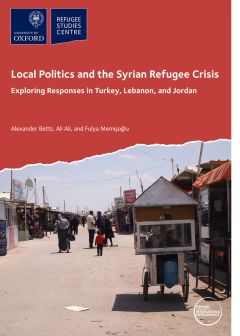Local Politics and the Syrian Refugee Crisis: Exploring Responses in Turkey, Lebanon, and Jordan
Alexander Betts, Ali Ali, Fulya Memişoğlu

In order to explain responses to Syrian refugees, it is important to understand politics within the major host countries. This involves looking beyond the capital cities to examine variation in responses at the local level. Turkey, Lebanon, and Jordan followed a similar trajectory as the crisis evolved. Each began the crisis in 2011 with a history of relative openness to Syrians, then increased restrictions especially around October 2014 with the growing threat of ISIS, before agreeing major bilateral deals with the European Union in early 2016. These common trajectories, however, mask significant sub-national variation. To explore this we examine three local contexts in each of the main countries: Gaziantep, Adana, and Izmir in Turkey; Sahab, Zarqa, and Mafraq in Jordan; and predominantly Christian, Shia, and Sunni areas in Lebanon. In each country, some governorates and municipalities have adopted relatively more inclusive or restrictive policies towards Syrian refugees. The main sets of factors that appear to mediate this relate to identity and interests, but also to the personalities of individual heads of municipal authorities. The report argues that political analysis – across all levels of governance – matters for refugee protection. There is a need to enhance the capacity for political analysis within humanitarian organisations.
